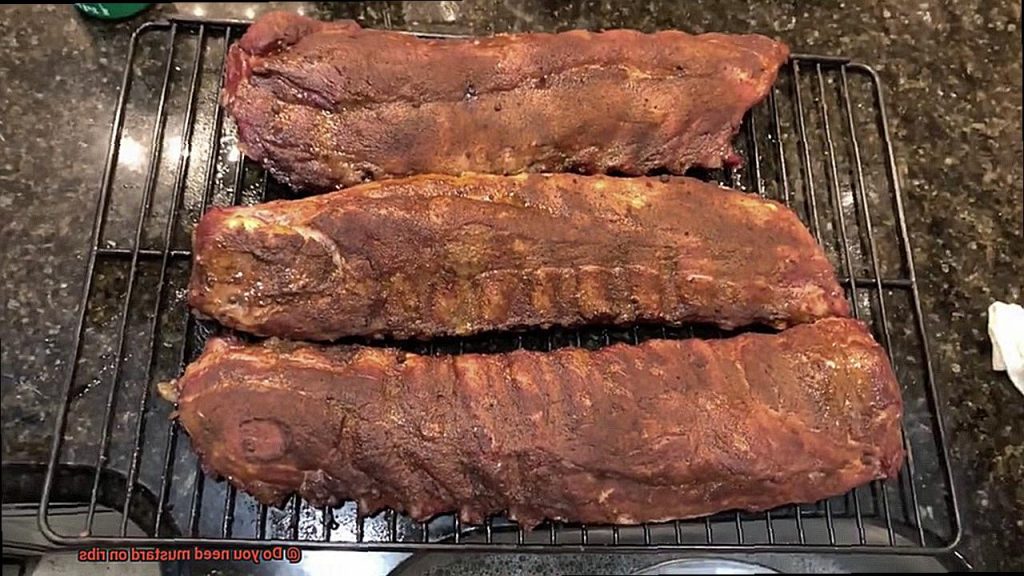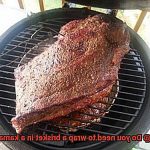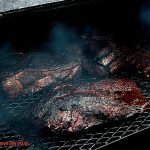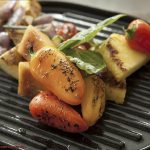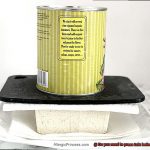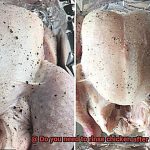Are you a BBQ fanatic in search of the perfect recipe for finger-licking, succulent ribs that will have everyone raving? Look no further than the great mustard debate. Some swear by the tangy zing and depth of flavor that mustard brings to the table, while others think it alters the taste of the meat too much.
But before we dive into this heated discussion, let’s talk about what makes ribs so irresistible. With their mouth-watering flavor and fall-off-the-bone tenderness, ribs are an unbeatable BBQ staple. But how do you achieve that perfect texture and taste? This is where the mustard debate comes in.
Many pitmasters claim that adding mustard to your rib rub helps tenderize the meat and allows seasonings to adhere better, resulting in a juicy, flavorful rack of ribs. Others argue that mustard is an unnecessary accessory that detracts from the natural taste of the meat.
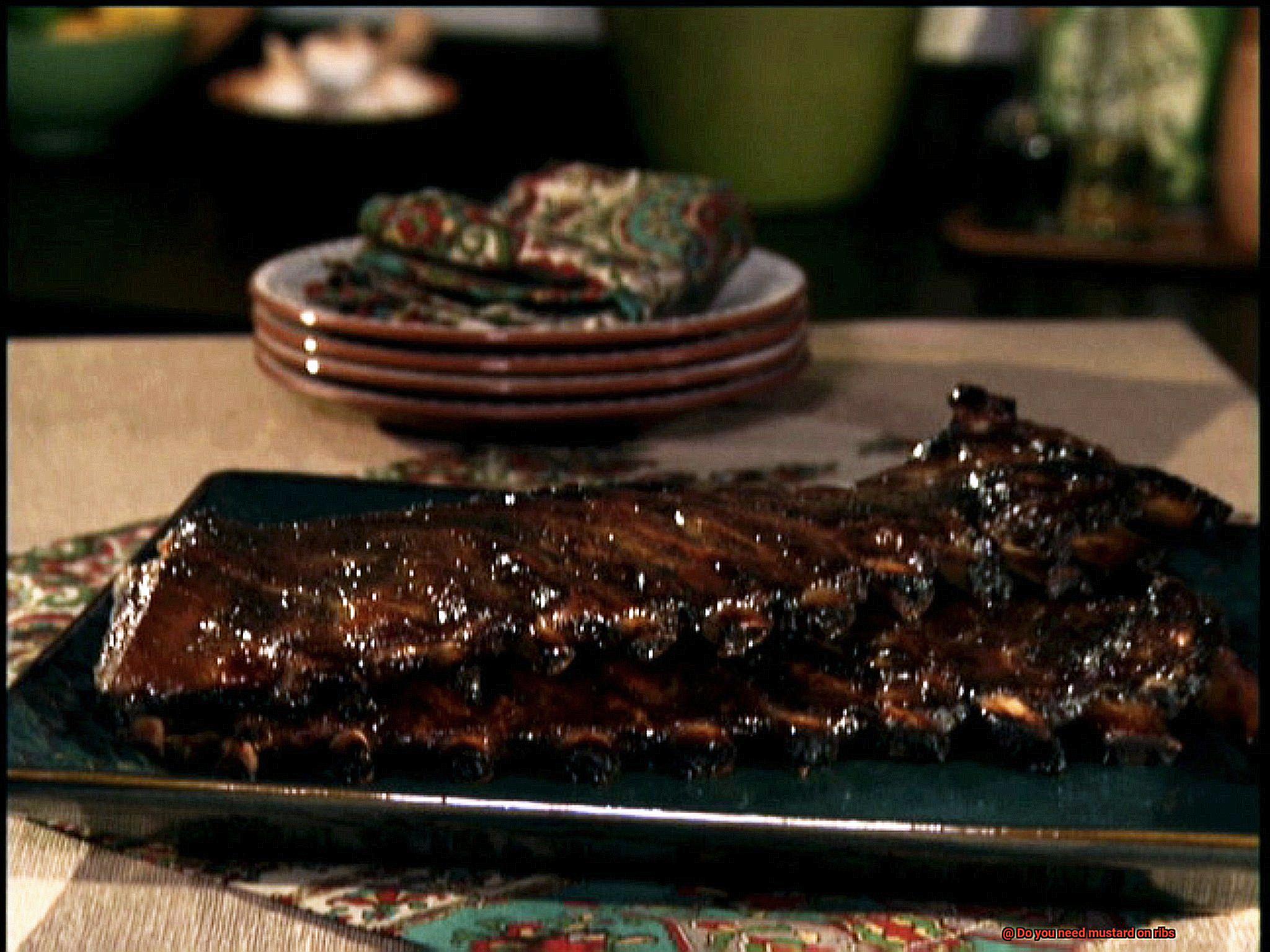
So what’s the verdict? Do you need mustard on your ribs? Is it worth adding to your recipe or just a personal preference? Let us delve into this BBQ trend and help you decide for yourself.
Contents
What Is Mustard and its Benefits for Ribs?
This versatile condiment has been used for centuries to add flavor and tanginess to food, and it can work wonders for your ribs.
So what exactly is mustard? Made from ground mustard seeds mixed with vinegar, water, and other spices, it comes in many different varieties ranging from yellow to spicy brown and Dijon. When used on ribs, it helps to tenderize the meat due to the acid in the vinegar. This means that your ribs will be more juicy and flavorful than ever before.
But that’s just the beginning of what mustard can do. It also adds depth and complexity to the flavor of your meat, complementing the smokiness of grilled or smoked ribs perfectly. And when used as a base for a rub or marinade, it helps to enhance the overall flavor profile of the meat.
Another benefit of using mustard on your ribs is that it acts as a glue for other seasonings and spices. When mixed with ingredients like brown sugar, garlic, and paprika, it creates a paste that sticks to the meat better than dry rubs alone. This results in a more flavorful and evenly seasoned piece of meat.
Now let’s talk about some specific benefits of using mustard on your ribs:
- Tenderizes the Meat: The vinegar in mustard helps break down the tough fibers in the meat, making it more tender and juicy.
- Adds Flavor: Mustard has a unique taste that pairs well with the smokiness of grilled or smoked ribs, enhancing the overall flavor profile of the meat.
- Acts as a Glue: Mustard acts as a glue for other seasonings and spices, creating a paste that sticks better to the meat than dry rubs alone resulting in a more evenly seasoned piece of meat.
Of course, there are those who argue that mustard is unnecessary or even overpowering. But at the end of the day, it comes down to personal preference. If you enjoy the added flavor and texture that mustard provides, then go ahead and use it. And if not, then skip it – what matters most is how you like your ribs.
Pros of Using Mustard on Ribs
When it comes to grilling or smoking ribs, the smallest details can make a world of difference to the final product. Many enthusiasts swear by using mustard as a base before applying their favorite rub, and for good reason. Not only does this create a more evenly seasoned dish, but mustard also offers a range of other benefits that can elevate your ribs to new heights.
First and foremost, mustard acts as an excellent binder that helps the rub adhere to the meat more effectively. This results in a more evenly seasoned dish, with every bite bursting with flavor. In addition to this, mustard contains vinegar which breaks down the connective tissue in the meat, making it more tender and juicy.
But that’s not all – mustard also plays a crucial role in creating a beautiful crust on the outside of the meat. As the sugars in your rub caramelize over high heat, they create a crispy and flavorful crust that’s sure to impress your guests. And because mustard acts as a glue for the rub, it helps hold that crust in place, preventing it from falling off or becoming too dry.
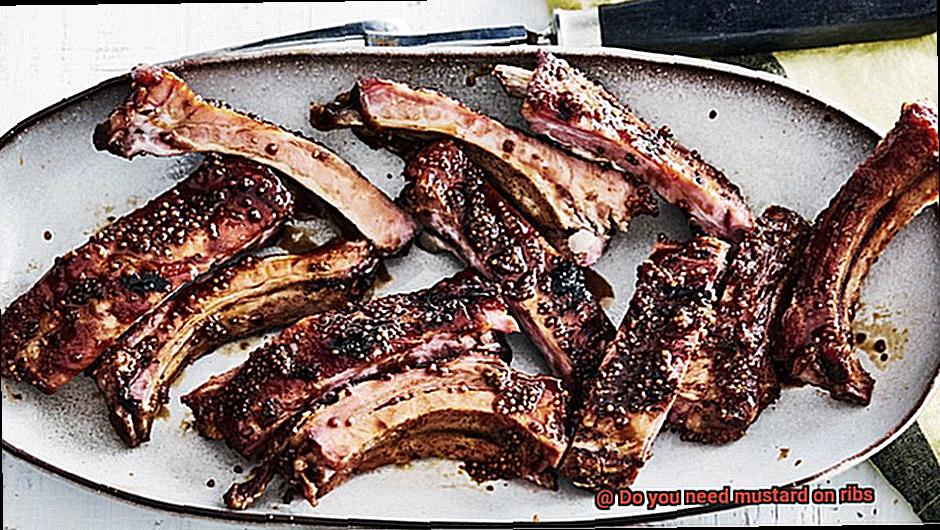
Furthermore, using mustard on ribs is an easy way to add some extra flavor to your dish. With so many different varieties available, you can choose one that complements your chosen rub and adds an extra layer of complexity to your flavor profile. Plus, if your rub is overly sweet or salty, mustard can help balance out those flavors for a perfectly balanced dish.
Cons of Using Mustard on Ribs
As a grill master, you know that using the right base for your rib rub is crucial to achieving mouth-watering, fall-off-the-bone goodness. Mustard is a popular choice for many, but beware of the potential cons before slathering it on. Let’s dive deeper into the downsides of using mustard on ribs.
Firstly, the tangy taste of mustard can be overpowering and may not appeal to everyone’s palate. If you’re looking for a more subtle flavor profile, it’s best to avoid using mustard as a base for your rub.
Another drawback of using mustard is that it can make the ribs too moist during cooking, leading to an undesirable texture. This is especially true if you’re cooking low and slow, where the moisture from the mustard can make the meat less tender and ultimately ruin your dish.
Moreover, applying too much mustard or not letting it dry out enough before adding your rub can create a crust that is too thick or tough. After spending hours grilling your ribs, this can be a major disappointment.
Lastly, some people simply don’t enjoy the taste of mustard and would prefer not to have it on their ribs at all. As a good host, it’s important to consider your guests’ preferences and cater to them accordingly.
Different Types of Mustards to Use on Ribs
Look no further than the versatile and flavorful mustard. Mustard can serve as a base for seasoning ribs and elevate the taste in unique ways. In this blog post, we will delve into the various types of mustards that can be used on ribs and how each one can enhance the flavor.
Yellow Mustard
The classic, go-to mustard for seasoning ribs is yellow mustard. Its tangy, slightly sweet flavor complements the smoky taste of ribs and creates a nice crust when grilled. Yellow mustard is also readily available and budget-friendly, making it a popular choice among grill masters. Some people like to mix yellow mustard with other seasonings such as brown sugar or paprika to create a rub for their ribs.
Dijon Mustard
If you’re looking for a more sophisticated flavor profile, Dijon mustard is an excellent option. Its sharp, slightly spicy taste can add depth to your ribs’ flavor without overpowering the other flavors. However, because it has a stronger taste, it’s crucial to use it sparingly.
Honey Mustard
For those with a sweet tooth, honey mustard is a perfect choice. It blends honey and mustard flavors to create a sweet and tangy kick that balances out the smokiness of the meat. Honey mustard also works as an excellent glaze during the cooking process.
Spicy Mustard
Also known as brown mustard, spicy mustard has a more pungent taste than yellow mustard, with a kick of heat that adds spice to your ribs. This bold flavor pairs well with the smoky taste of meat, creating a delicious and robust combination. However, like Dijon mustard, it should be used sparingly so as not to overpower the other flavors.
How to Apply Mustard on Ribs
Ribs are a classic dish that can be enjoyed year-round, but if you really want to impress your guests, you need to try applying mustard on them before grilling. This simple yet effective technique has been used by many pitmasters to enhance the flavor and texture of their ribs. In this article, we will guide you through the step-by-step process of how to apply mustard on ribs before grilling.
Step 1: Select Your Mustard
The first step in this process is to select your preferred type of mustard. While yellow mustard is a popular choice among many pitmasters, you can use any type of mustard that you prefer. Once you have your mustard ready, it’s time to move on to the next step.
Step 2: Apply Mustard on Ribs
Using a brush or your hands, apply a thin layer of mustard onto the surface of your ribs. It’s important to cover the entire surface of the ribs with the mustard evenly. The mustard acts as a binder, helping the seasoning to adhere better to the meat and creating a delicious and flavorful bark on the outside of the ribs.
Step 3: Season Your Ribs
After applying the mustard, it’s time to season your ribs. You can use any seasoning you prefer, but a classic rib rub typically includes ingredients like brown sugar, salt, paprika, garlic powder, onion powder and black pepper. Sprinkle your seasoning evenly over the top of your ribs, making sure to cover every inch of the surface.
Step 4: Let Your Ribs Sit
Once you’ve applied the seasoning, let your ribs sit for at least 30 minutes before placing them on the grill. This allows time for the flavors to meld together and for the seasoning to penetrate into the meat.
Step 5: Grill Your Ribs
When it’s time to grill, be sure to brush off any excess rub before placing the ribs on the grill. The mustard will help create a nice crust on the outside of the ribs while keeping them moist and tender on the inside. Grill your ribs until they’re fully cooked, and enjoy.
Tips for Perfectly Grilling Ribs with Mustard
Grilling ribs with mustard is a popular technique that can take your BBQ game to the next level. Here are five tips to help you perfectly grill ribs with mustard:
Choose the Right Mustard
When grilling ribs with mustard, it’s important to choose the right type of mustard. Dijon mustard is a popular choice due to its smooth texture and tangy flavor that complements the meat well. However, you can also experiment with different types of mustard such as yellow or spicy brown depending on your preference.
Apply Mustard Evenly
Before grilling the ribs, apply a generous amount of mustard evenly over the entire surface of the meat using a brush or your hands. This will help the mustard flavor penetrate the meat, resulting in a more flavorful and tender dish.
Marinate the Meat
After applying the mustard, let the meat marinate for at least an hour before grilling. This allows the flavors to develop and infuse into the meat fully. You can even let it marinate overnight for a more intense flavor.
Use Indirect Heat
When it comes time to grill, use indirect heat by setting up your grill in a way that the heat source is not directly under the meat. This will prevent the meat from burning and drying out, resulting in perfectly grilled and juicy ribs.
Baste with Sauce
While grilling the ribs, baste them with BBQ sauce every 10-15 minutes. This will add an extra layer of flavor to the dish and keep the meat moist and tender.
Finally, let the ribs rest for 10-15 minutes before slicing and serving. This allows the juices to redistribute throughout the meat and ensures that your ribs are tender and juicy.
Alternatives to Using Mustard on Ribs
If you’re tired of using mustard on your BBQ ribs, or if you can’t use it due to dietary restrictions, don’t worry. There are plenty of alternatives available that can give you delicious, tender, and flavorful ribs without the need for mustard.
One popular alternative is to use a vinegar-based marinade. Not only does this help to tenderize the meat, but it also infuses it with mouth-watering flavors. You can experiment with different types of vinegar like apple cider or balsamic and add herbs and spices for added interest.
For a sweeter taste, fruit juice marinades work wonders. Pineapple juice contains enzymes that break down the meat while giving it a sweet and tangy flavor. Other juices like orange or lemon can add a refreshing citrus twist to your ribs.
If you’re looking for a spicy kick, hot sauce is an excellent option. It adds heat and depth of flavor to your ribs without overpowering them. Be sure to choose a hot sauce that complements the other flavors in your rub.
Finally, if you prefer to skip the marinade altogether, a dry rub is always an excellent option. A good dry rub can contain a variety of herbs, spices, and seasonings that give your ribs plenty of flavor without any liquid base. Apply it generously and let it sit on the meat for at least an hour before grilling.
FGqz3kRKGvY” >
Conclusion
Ribs are the quintessential BBQ dish that everyone wants to perfect. And while there are many ways to season and cook them, some pitmasters swear by adding mustard to their rib rub. The tangy zing and depth of flavor that mustard brings can enhance the natural taste of meat while tenderizing it and allowing seasonings to adhere better. But is mustard a must-have ingredient for delicious ribs? Ultimately, the answer depends on your personal preference.
Mustard is made from ground mustard seeds mixed with vinegar, water, and spices. When used on ribs, it can provide several benefits: it tenderizes the meat due to the acid in the vinegar, adds complexity to the flavor profile of meat, acts as a glue for other seasonings and spices, and creates a beautiful crust on the outside of the meat. However, some argue that mustard’s tangy taste can be overpowering or make the ribs too moist during cooking.
If you decide to use mustard on your ribs, there are different types available such as yellow mustard for classic seasoning or Dijon for a more sophisticated flavor profile. Applying mustard evenly before seasoning your ribs is crucial for maximum flavor penetration. And if you want alternatives to using mustard on your ribs due to dietary restrictions or personal preference, vinegar-based marinades, fruit juice marinades, hot sauce, or dry rubs are excellent options.
In conclusion, whether you need mustard on your ribs is entirely up to you. But with its numerous benefits and versatility in enhancing flavor profiles, it’s worth giving it a try at least once in your BBQ journey. Experiment with different types of mustard and find what works best for you.

